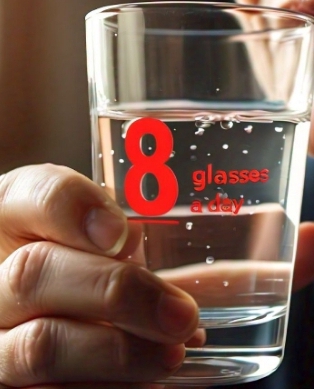- This myth likely originated from a 1945 report that suggested people consume about 2.5 liters of water daily, but this included water from all sources, like food and other beverages.
- There is no scientific evidence to support the claim that drinking exactly 8 glasses (about 2 liters) of water is required for proper hydration.
Reality: Our hydration needs vary depending on individual factors.
- Age: Older adults may need more water due to decreased thirst sensation and changes in body composition.
- Sex: Pregnant and breastfeeding women may need more water due to increased fluid needs.
- Weight: People with a higher body mass index (BMI) may need more water due to their larger body size.
- Activity level: Athletes and individuals who engage in strenuous physical activity may need more water to replace lost fluids.
- Climate: People living in hot and humid climates may need more water due to increased fluid loss through sweating.
Myth: Not drinking enough water leads to dehydration and serious health issues.
- Mild dehydration is common and harmless, and our bodies are capable of regulating water levels.
- Severe dehydration is rare and usually occurs in extreme circumstances, such as:
- Prolonged diarrhea or vomiting
- Excessive sweating in high temperatures
- Inadequate fluid intake in elderly or hospitalized individuals
Myth: Water is the best beverage for hydration.
- While water is great, other fluids like:
- Milk and juice contain water and contribute to hydration
- Coffee and tea, despite their diuretic effect, can still contribute to hydration
Myth: We need to drink water constantly throughout the day.
- Our bodies can handle periods of water scarcity, and drinking when thirsty is a more effective way to stay hydrated.
- Forcing excessive water intake can lead to overhydration (hyponatremia), which is rare but potentially harmful.
Myth: Bottled water is the purest and healthiest option.
- Tap water is often just as safe and regulated, and bottled water can have its own set of contaminants, such as:
- BPA from plastic bottles
- Microplastics
- Bacterial growth in stagnant water
By understanding these myths and realities, we can adopt a more balanced and mindful approach to hydration, listening to our bodies and drinking when thirsty, rather than following arbitrary guidelines.
Visited 13 times, 1 visit(s) today


